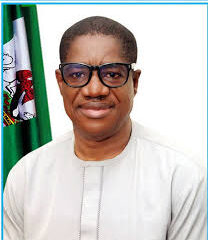Editorial
MEND And Threat Of Fresh Attack
Just last week, a splinter group of the Movement for the Emancipation of the Niger Delta (MEND) issued a fresh threat to embark on a large-scale violent insurgency. MEND, indeed, vowed to start a bombing campaign against mosques, hajj camps, Islamic institutions and their clerics in retaliation against wanton killing of Christians in the Northern part of the country by suspected members of Boko Haram, a terrorist sect, whose activities and attacks had claimed thousands of lives and destroyed property.
MEND’s spokesman, Jomo Gbomo via an email message said the campaign code-named “Operation Barbarossa” will commence on May 31, 2013, and warned that the onslaught would not be like any kind witnessed before Federal Government’s amnesty proclamation for Niger Delta militants in 2009.That it would indeed be mind-buggling.
The Tide, and many other well-meaning Nigerians are worried by the fresh threat of insurgency by MEND, particularly at this point in time when government had done reasonably well under the amnesty programme to assuage the feelings of Niger Deltans and militant groups in the region.
Certainly, the amnesty package may not have been as comprehensive as expected to cater for all splinter groups of MEND, but we believe that there are still rooms for dialogue for aggrieved persons not incorporated in the initial package.
As supposed, stakeholders in the Nigerian project, MEND’s threat of targeting religious places of worship or persons is most condemnable just as The Tide has repeatedly condemned and considered as unfathomable, criminal and vexatious in all ramifications the excesses of Boko Haram against Christians and churches.
Truth is, two wrongs cannot make a right, therefore, to target innocent Moslems and clerics who may be ignorant and innocent of Boko Haram’s atrocities may not necessarily be the solution to the security challenge occasioned by insurgency in parts of the North.
This is why The Tide joins other well-meaning Nigerians and indeed the Christian Association of Nigeria (CAN) to appeal to MEND to reconsider its position and allow the prevailing peace reign continually in the Niger Delta region. We say so because the very essence of the Niger Delta protest was for socio-economic integration, against systemic marginalization and crass denial of the people’s right to manage their own God-given resources. It was also to protest against lack of political space. All these cannot be addressed in an atmosphere of rancour and violent unrest as being threatened.
However, if MEND has fresh grievances not accommodated by the initial amnesty arrangement, such reservations should be brought to the negotiating table and not to heat up the region which has enjoyed relative peace and development in the last few years.
We insist and very strongly too, that no matter the grievances over the excesses of Boko Haram in parts of the North, any counter-attack or threat against Moslems and their clerics in reprisal is ill-advsied, condemnable and may be counter-productive in the long run.
Certainly, Christians and Christianity abhor taking another person’s life. It is not in the character of Christians to abuse the sanctity of human life which MEND’s threat tends to portray.
The Tide, and indeed, many others believe that renewed hostilities in the once volatile Niger Delta region could have far-reaching negative consequences on the lives and economy of the region, and jeopardise development efforts being carried out by various states and local government areas in the region.
We hold strongly to the view that nothing gainful can be achieved in an atmosphere of war or terror as evidenced in the Northern part of the country where Boko Haram’s insurgency had left untold hardship on innocent people and particularly paralysed the economy of the affected states.
MEND should and must toe the path of peace through dialogue and negotiation. That is the acceptable way forward.
Editorial
UNIPORT @50: Celebrating Excellence

The University of Port Harcourt’s Golden Jubilee celebration, which commenced on 21st July, was concluded yes
terday. With the theme “Celebrating 50 Years of Excellence,” the week-long event offered a reflective look at the institution’s extraordinary transformation—from its humble beginnings in 1975 as a budding academic centre to its present status as a symbol of scholarly excellence in Nigeria and beyond. Founded by the Federal Government as University College, Port Harcourt, it attained full university status in 1977, true to its guiding motto, “For Enlightenment and Self-Reliance.”
This institution has been instrumental in shaping Nigeria’s educational landscape. Its leadership journey began with the pioneering efforts of its first Vice-Chancellor, Professor Donald Ekong, who served from 1977 to 1982. During his tenure, he established the academic foundation and values that have continued to guide the university. Successive administrations have built upon this legacy, with the current Vice-Chancellor, Professor Owunari Georgewill, carrying the torch of visionary leadership.
Over the past five decades, the University of Port Harcourt (UNIPORT) has blossomed into a veritable melting pot of disciplines, celebrated for its impressive research output and unwavering contributions to national development. What began in 1977 with a modest six schools evolved into a full-fledged faculty system by 1982, a strategic shift designed to accommodate its expanding academic programmes and swelling student population. This transformation is a testament to the university’s ability to move with the times and keep its finger on the pulse of higher education.
UNIPORT was established during a period when the nation’s leaders recognised the pressing need to widen access to tertiary education. Its founding vision was not simply to churn out graduates, but to cultivate thinkers, innovators, and nation-builders. Through thick and thin, the institution has remained steadfast to this noble mission, undeterred by the challenges that have inevitably come its way.
The university’s commitment to fostering goodwill with its host communities, such as Choba and Aluu, speaks volumes. Recent visits by the Governing Council, under the leadership of Senator Mao Ohuabunwo, highlight a hands-on approach to building bridges and strengthening these crucial relationships. After all, maintaining a strong social licence to operate is no walk in the park and requires constant effort and engagement.
UNIPORT’s pursuit of academic excellence has not gone unnoticed on the international stage. In 2015, the university pulled off a remarkable coup when “Times Higher Education” ranked it sixth in Africa and first in Nigeria – a feather in its cap and a clear endorsement of its commitment to quality education, ground-breaking research, and innovation. This accolade has firmly cemented its standing among the continent’s foremost academic powerhouses.
Its research achievements have been nothing short of transformative, particularly in fields such as health, petroleum exploration, and environmental sciences. The trailblazing innovations of the Central Instrument Laboratory, showcased during World Laboratory Day 2025, underline its critical role in pushing scientific boundaries. Today, its reputation as Nigeria’s top research institution stands as incontrovertible proof of its intellectual mettle.
Since July 2021, the university has been under the astute leadership of Professor Georgewill, whose tenure has been marked by far-reaching initiatives aimed at raising the bar in academics, research, and community service. His administration has been keen to leave no stone unturned in enhancing the university’s global profile.
With 14 faculties and more than 60,000 students, UNIPORT has produced an army of distinguished graduates – from Masters and PhD holders excelling worldwide to public figures of national prominence. Among its illustrious alumni are former President Goodluck Jonathan, ex-Rivers State governors Chibuike Amaechi and Nyesom Wike, as well as Abia State Governor Alex Otti. The Theatre Arts Department has also given Nigeria some of its brightest Nollywood stars, including Rita Dominic, Sam Dede, and Hilda Dokubo, who have all added rich hues to the country’s cultural tapestry.
The university’s legacy is further enriched by the scholarship of eminent academics such as Professor Ebiegberi J. Alagoa, renowned historian and former vice-chancellor, Professor Kelsey Harrison, the acclaimed gynaecologist and former vice-chancellor, and the late intellectual giants, Professors Ola Rotimi, Kay Williamson, Nimi Briggs, and Claude Ake. Their enduring contributions have ensured UNIPORT remains a cradle of intellectual brilliance.
Yet, it would be remiss to ignore the hurdles ahead. Infrastructure development, though ongoing, often feels like watching paint dry. The Senate Building’s relocation from Delta Park to University Park marks some progress, but facilities such as the crumbling University Crab and the overstretched teaching hospital are crying out for attention. A shortage of lecture halls, classrooms, and hostels continues to hamper the learning experience. The golden jubilee is, therefore, a golden opportunity to tackle these gaps head-on and set UNIPORT on a path to global prominence.
As this Ivory Tower celebrates its 50th anniversary, it must also take stock and look to the future with a bold vision. To climb the global university rankings, it needs to invest strategically in world-class research, digital education, and international collaborations with top-tier institutions.
We call upon the Federal and Rivers State Governments, corporate organisations, and public-spirited individuals to rally behind UNIPORT’s renewal. A university that has shaped leaders of national and global stature should not be left to make bricks without straw; it deserves robust financial and infrastructural backing.
On this historic milestone, we heartily congratulate the University of Port Harcourt for half a century of service to Nigeria and humanity. The next fifty years should be marked by audacious ambitions, cutting-edge innovation, and an unrelenting pursuit of excellence. Here is to a golden past and an even brighter future, the best, as they say, is yet to come!
Editorial
Benue Killings: Beyond Tinubu’s Visit

The recent massacre in Yelewata, Benue State, ranks among Nigeria’s deadliest attacks of
2025. While official figures put the death toll at 59, media reports and Amnesty International estimate between 100 and 200 fatalities. This atrocity extends a decade-long pattern of violence in Nigeria’s Middle Belt, where Beacon Security data records 1,043 deaths in Benue alone between May 2023 and May 2025.
President Tinubu’s visit on 18 June—four days after the 14 June attack—has drawn sharp criticism for its lateness. This delay echoes a history of inadequate responses, with Human Rights Watch documenting similar inaction in Plateau and Kaduna states since 2013, fuelling a culture of impunity. The attack lasted over two hours without meaningful security intervention, despite claims of swift action.
The violence bore hallmarks of genocide, with survivors recounting systematic house burnings and executions. More than 2.2 million people have been displaced in the region since 2019 due to comparable attacks. Data show Benue’s agricultural output falls by 0.21 per cent in crops and 0.31 per cent in livestock for every 1 per cent rise in violence.
Security forces continue to underperform. No arrests were made following the Easter attacks in April (56 killed) or May’s Gwer West massacre (42 killed). During his visit, Tinubu questioned publicly why no suspects had been detained four days after Yelewata, highlighting entrenched accountability failures.
The roots of the conflict are complex, with climate change pushing northern herders south and 77 per cent of Benue’s population reliant on agriculture. A Tiv community leader described the violence as “calculated land-grabbing” rather than mere clashes, with over 500 deaths recorded since 2019.
Government interventions have largely fallen short. The 2018 federal task force and 2025 Forest Guards initiative failed to curb violence. Tinubu’s newly announced committee of ex-governors and traditional rulers has been met with scepticism given the litany of past unkept promises.
The economic fallout is severe. Benue’s status as Nigeria’s “food basket” is crumbling as farms are destroyed and farmers displaced. This worsens the nation’s food crisis, with hunger surges in 2023-2024 directly linked to farming disruptions caused by insecurity.
Citizens demanding justice have been met with force; protesters faced police tear gas, and the State Assembly conceded total failure in safeguarding lives, admitting that the governor, deputy, and 32 lawmakers had all neglected their constitutional responsibilities.
The massacre has drawn international condemnation. Pope Leo XIV decried the “terrible massacre,” while the UN called for an investigation. The hashtag “200 Nigerians” trended worldwide on X, with many contrasting Nigeria’s slow response to India’s swift action following a plane crash with similar fatalities.
Nigeria’s centralised security system is clearly overwhelmed. A single police force is tasked with covering 36 states and 774 local government areas for a population exceeding 200 million. Between 2021 and 2023 alone, 29,828 killings and 15,404 kidnappings were recorded nationally. Proposals for state police, floated since January 2025, remain stalled.
Other populous nations offer alternative models. Canada’s provincial police, India’s state forces, and Indonesia’s municipal units demonstrate the effectiveness of decentralised policing. Nigeria’s centralised structure creates intelligence and response gaps, worsened by the distance—both physical and bureaucratic—from Abuja to affected communities.
The immediate aftermath is dire: 21 IDP camps in Benue are overwhelmed, and a humanitarian crisis is deepening. The State Assembly declared three days of mourning (18-20 June), but survivors lack sufficient medical aid. Tragically, many of those killed were already displaced by earlier violence.
A lasting solution requires a multi-pronged approach, including targeted security deployment, regulated grazing land, and full enforcement of Benue’s 2017 Anti-Open Grazing Law. The National Economic Council’s failure to prioritise state police in May 2025 represents a missed chance for reform.
Without decisive intervention, trends suggest conditions will worsen. More than 20,000 Nigerians have been killed and 13,000 kidnapped nationwide in 2025 alone. As Governor Hyacinth Alia stressed during Tinubu’s visit, state police may be the only viable path forward. All 36 states have submitted proposals supporting decentralisation—a crucial step towards breaking Nigeria’s vicious cycle of violence.
Editorial
Responding To Herders’ Threat In Rivers

-

 Opinion5 days ago
Opinion5 days agoWhy Not Ban Alcohol Sachets?
-

 Niger Delta5 days ago
Niger Delta5 days agoBlue Economy: Revamping More Ports Will Boost National Development – Aniagwu
-

 News5 days ago
News5 days agoAdministrator Urges CDCs To Protect Govt Property
-

 News5 days ago
News5 days agoNUJ Hails Sirawoo’s Redeployment To Rivers Information Ministry
-

 Business5 days ago
Business5 days agoAbia Takes Over Electricity Supply In 8 LGAs
-

 Politics5 days ago
Politics5 days agoWHY I SEE NO REASON FOR MORE STATES IN NIGERIA — OZEKHOME
-

 Politics5 days ago
Politics5 days agoAnambra Guber: Ex-minister Endorses Soludo For Second Term
-

 Opinion5 days ago
Opinion5 days agoJudicial Fraud And Land Grabbing


